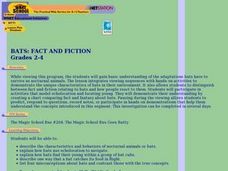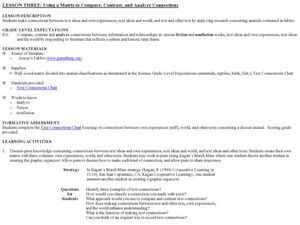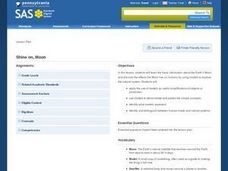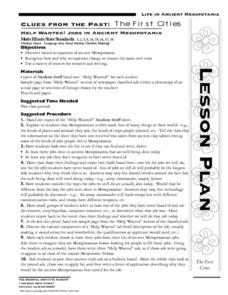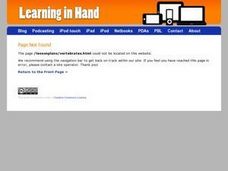Curated OER
Species at Risk: Recovery Teams to the Rescue!
Sixth graders discuss how certain species and plants are deemed endangered. They work together in conservation recovery teams to research an endangered species. Then they explore efforts to make sure that the existence of these species...
Curated OER
Magnificent Metamorphosis
Students discover stages in metamorphosis through up close and real encounters with video, hands-on investigative and interactive activities using mealworms.
Curated OER
Birds of a Feather
Students investigate birds and complete a variety of bird-themed activities. They read books and observe birds noting their physical characteristics, development and life cycle stages.
Curated OER
Thematic Unit on Cats
Students discover in which climates the cats of the world live in. They review the different climates of the world and use maps and globes to help them locate continents.
Curated OER
Transportation History
Learners research the major developments in transportation. In groups, they use this information to plot them on a timeline. They also write a paragraph about how advances in technology have changed the world. As a class, they discuss...
Curated OER
Bats: Fact and Fiction
Young scholars describe the characteristics and behaviors of bats. After viewing a video, they explain how bats use echolocation to navigate and how they find their young within a group. They list four misconceptions about the animal...
Curated OER
Using Comics to teach Habitat and the Balance of Nature
Students visit a specific online comics website to view a comic. They discuss the elements of the food chain that were seen in the story. They choose an inhabitant of the pond habitat that they have been reading about and do a research...
Curated OER
Great Salt Lake
Fourth graders make an ecosystem that brine shrimp can live in and take data as to what level of salinity the water is, how cold it is, and other data that students may think is important. They also hypothesize and predict the outcomes...
Curated OER
Wetland Metaphors
Students are presented with a selection of hands on objects for investigation as metaphors for natural functions of wetlands. A 'Mystery Metaphor Container' is presented to the class with everything having to do with a wetland in some...
Curated OER
Forest Friends Forever
Students investigate how to use the senses to gather information about objects such as size, shape, color, texture, sound, position, and change (qualitative observations are utilized throughout this lesson plan). They investigate and...
Curated OER
Algal Blooms
For this algal blooms worksheet, students order the stages of a red tide. They answer two short answer questions. Students define three terms relating to algal blooms.
Curated OER
Using a Matrix to Compare, Contrast, and Analyze Connections
Young scholars explore writing techniques by comparing fiction vs. non-fiction. For this literature analysis lesson, students read stories from Aesop's Fables and compare the themes and characters to stories from their own life. Young...
Pennsylvania Department of Education
Pennsylvania’s Energy Supply
Third graders become familiar with the various types of energy and which types are found in Pennsylvania. In this Pennsylvanian energy resources lesson, 3rd graders, identify wind and water as sources of energy. Students complete an...
Pennsylvania Department of Education
Wind and Water Wheels
Students identify wind and water as natural resources that create energy. For this natural resources and energy use lesson, students work in groups to construct a pinwheel, then explore the effects of wind and water on the pinwheel....
Curated OER
Shine On, Moon
Students explore space science by conducting an experiment in class. In this Moon lesson plan, students define a list of space science vocabulary and read the book The Moon. Students utilize shoeboxes and string to conduct a sunlight...
Curated OER
WONDERFUL, WATERFUL WETLANDS
Young scholars list characteristics of wetland and describe the functions of a wetland.
Curated OER
The Void Filled by Nonprofits
Pupils examine the significance of nonprofit organizations in a democratic society. They conduct research on a selected nonprofit organization, complete a questionnaire, and present their findings to the class.
Curated OER
Little Me in a Big World: Ants
First graders predict, observe and record strategies to overcome them using discussions, role play, and charts. Over a three or four day period, they examine obstacles that humans and insects encounter.
Curated OER
The Spider Beside Her
Second graders expand their knowledge of spiders. By creating a model of a spider, 2nd graders recognize differences between spiders and insects and determine that a spider is not an insect.
Curated OER
Help Wanted! Jobs in Ancient Mesopotamia
Students explore life in early Mesopotamia through a list of jobs that people taken from an ancient clay tablet found in Mesopotamia. The list is compare to jobs still performed in today's society.
Curated OER
Types of Pollution
Young scholars differentiate between various types of water pollution and complete a Venn diagram with the information. They consider why there are laws regulating the release of pollution in water and discuss solutions to pollution...
Curated OER
Vertebrates are Cool!
Students conduct research on various vertebrates. They read the eBook 'Vertebrates,' select a vertebrate, conduct research, and create an eBook with one photo about their chosen vertebrate.
Curated OER
Animal Research Project
First graders are introduced to the topic of researching by the librarian. Using a worksheet, they use various sources in the library to choose one animal from various groups. They complete a fact sheet on each animal and report their...
Curated OER
Colored Dots 1
Young scholars observe that colored markers are a mixture of many different colors by performing a chromatography experiment. They make observations, record information, and make generalized inferences from their observations.







